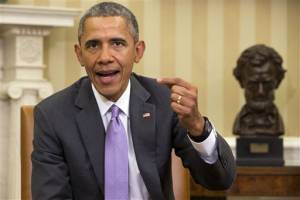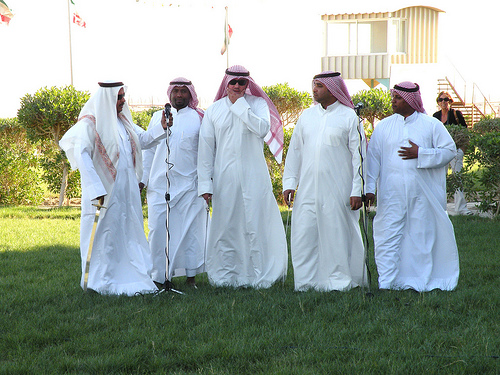
US President Barack Obama (AP /Jacquelyn Martin)
Arab leaders have expressed deep concern over the nuclear deal that was reached this week between Iran and the world powers, including the US.
By Khaled Abu Toameh, The Gatestone Institute
“This is a dangerous agreement… [it] provides Iran with what it needs most to pursue its wars and expansionism against the Arabs: funds.” — Salah al-Mukhtar, Ammon News.
“Iran has tried to intervene in Iraq, Lebanon and Syria and it is seeing that it’s not paying any price… There is also a feeling in Tehran that the U.S. is avoiding a military confrontation with the Iranians.” — Hassan al-Barari, Al-Sharq.
According to Hani al-Jamal, an Egyptian political and regional researcher, the deal means that the international community has accepted Iran as a nuclear power.
Many Arabs have expressed deep concern over the nuclear deal between Iran and the world powers, including the US, that was reached this week.
Arab leaders and heads of state were polite enough not to voice public criticism of the agreement when US President Barack Obama phoned them to inform them about it. But this has not stopped Arab politicians, political analysts and columnists reflecting government thinking in the Arab world from lashing out at what they describe as “Obama’s bad and dangerous deal with Iran.”
Sign of US Weakness?
The Arabs, especially those living in the Gulf, see the framework agreement as a sign of US “weakness” and a green light for Iran to pursue its “expansionist” scheme in the Arab world.
“Some Arab countries are opposed to the nuclear deal because it poses a threat to their interests,” said the Egyptian daily Al-Wafd in an article entitled, “Politicians: Obama’s deal with Iran threatens Arab world.”
The newspaper quoted Hani al-Jamal, an Egyptian political and regional researcher, as saying that the deal means that the international community has accepted Iran as a nuclear power. He predicted that the framework agreement would put Iran and some Arab countries such as Saudi Arabia and Egypt on a collision course.
Al-Jamal advised the Arab countries to form a “Sunni NATO” that would guarantee Pakistan’s status as a nuclear power and Arab ally in face of the “Iranian and Israeli threat.”
Jihad Odeh, an Egyptian professor of political science, said that Obama’s “achievements are designed to dismantle the Arab world. Obama wants to make historic achievements before the end of his term in office by destroying Al-Qaeda, seeking rapprochement with Cuba and reaching a nuclear agreement with Iran.”
Although Saudi Arabia, which is currently waging war on Iranian-backed Houthi militiamen in Yemen, “welcomed” the nuclear agreement, it has privately expressed concern over the deal.
Gulf States Voicing Concern
Similarly, several Gulf countries that initially welcomed the agreement are beginning to voice concern over its repercussions on the region. For the past several months, the Arabs have been warning against Iran’s ongoing effort to take control over their countries.
“The US surely does not want to see a more powerful Iranian hegemony in the region, but at the same time, it does not appear to mind some kind of Iranian influence in the region,” said Nasser Ahmed Bin Ghaith, a researcher from the United Arab Emirates. “Iran has been seeking to reclaim its previous role as the region’s police.” Bin Ghaith said that it was clear that Western recognition of Iranian regional influence would come at the expense of the Gulf countries. “The Gulf states should build strategic partnerships with the regional powers of Pakistan and Turkey, who share the Gulf nations’ fears of Iranian ambitions in the region,” he added.
Widespread Fear of Iranian Ambitions
Echoing widespread fear among Arabs of Iran’s territorial ambitions in the Middle East, political analyst Hassan al-Barari wrote in Qatar’s daily Al-Sharq against the policy of appeasement toward Tehran:
“Iran has tried to intervene in Iraq, Lebanon and Syria and it is seeing that it’s not paying any price; on the contrary, there are attempts by the big powers to reach understandings with Iran. There is also a feeling in Tehran that the US is avoiding a military confrontation with the Iranians and their proxies. The Gulf countries have learned from the lessons of the past in various areas. The policy of appeasement has only led to wars. Any kind of appeasement with Iran will only lead it to ask for more and probably meddle in the internal affairs of the Arab countries and increase its arrogance.”
Even Jordanians have joined the chorus of Arabs expressing fear over Iran’s growing threat to the Arab world, especially in wake of the nuclear deal with the US and the big powers.
Salah al-Mukhtar, a Jordanian columnist, wrote an article entitled, “Oh Arabs wake up, your enemy is Iran,” in which he accused the US of facilitating Tehran’s wars against Arab countries.
Iran’s ‘Destructive Wars’
Describing Iran as “Eastern Israel,” al-Mukhtar said that the most dangerous aspect of the framework agreement is that it allows Iran to continue with its “destructive wars” against the Arabs. “This is a dangerous agreement, particularly for Saudi Arabia and the opposition forces in Iraq and Syria,” the Jordanian columnist cautioned. “This agreement provides Iran with what it needs most to pursue its wars and expansionism against the Arabs: funds. Lifting the sanctions is America’s way of backing the dangerous and direct wars against Arabs; the lifting of the sanctions also provides the Iranians with the funds needed to push with their Persian advancement. The US wants to drain Saudi Arabia and the Arab Gulf countries in preparation for dividing them.”
Lebanon’s English-language Daily Star newspaper also voiced skepticism over the nuclear deal. “For all the talk of this deal contributing to making the world safer, if Obama is truly concerned with his legacy, especially in the Middle East, he must now work with Iran to encourage it to become a regular member of the international community once again, and not a country which sponsors conflict, whether directly or via proxies, across the region,” the paper editorialized. “Otherwise, this deal could just leave Iran emboldened in its expansionist designs.”
Iranian Opposition Figures
In addition to the Arabs, Iranian opposition figures have also come out against the nuclear deal.
Maryam Rajavi, an Iranian politician and president of the National Council of Resistance, commented:
“A statement of generalities, without spiritual leader Khamenei’s signature and official approval, does not block Tehran’s path to a nuclear bomb nor prevent its intrinsic deception.
“Continuing talks with religious fascism in Iran – as part of a policy of appeasement – will not secure the region and world from the threat of nuclear proliferation.
“Complying with UN Security Council resolutions is the only way to blocthe mullahs from obtaining nuclear weapons.
“Leniency and unwarranted concessions by the P5+1 to the least trustworthy regime in the world today only grants it more time and further aggravates the dangers it poses to the Iranian people, to the region and to the wider world.”
